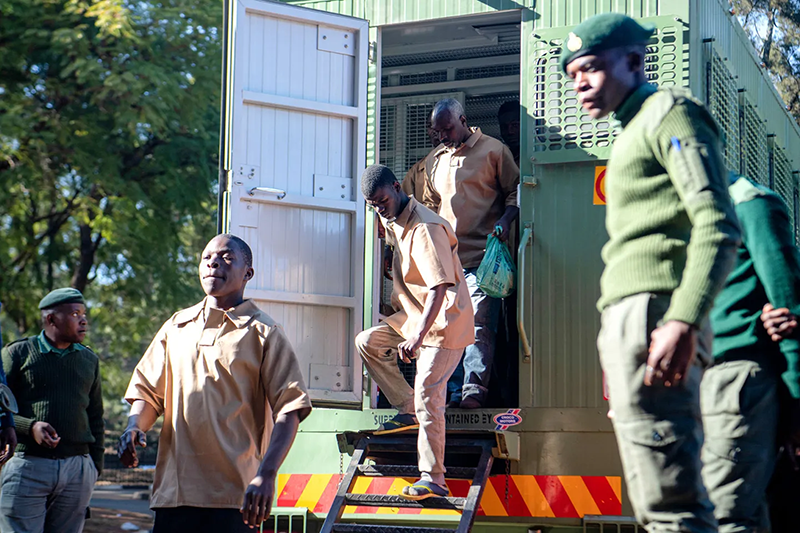- Opinion
- No Comment
South Africa must lead the way in reforming SADC as leaders prepare to gather in Zimbabwe

By Emma Powell I Daily Maverick
As Zimbabwe host the 44th SADC Summit of Heads of State and Government this weekend, the paranoid Mnangagwa regime has unleashed a brutal crackdown on already tormented civilians. Regional media has been awash with reports of police brutality, arbitrary arrests, the unlawful detention of pro-democracy activists and frenzied government spending.
In recent days, traffic in the central business district of Harare has been brought to a standstill as police tankers and army trucks roll through the city, while security forces prowl the streets in Gweru, Kwekwe, Mutare and Chitungwiza — the dormitory town next to Harare. Opposition politicians, civil society leaders and pro-democracy activists are all targets of paranoid state surveillance networks.
Local academics estimate that $240-million has been spent by President Emmerson Mnangagwa’s bankrupt government to beautify the precinct surrounding the summit. No expense has been spared in revamping transport corridors between the airport and the host venues. Streetside traders have been instructed to shut shop, local transport operators have been chased out of the area, and luxury villas erected in record time for presidential visitors.
As Zanu-PF rolls out the red carpet for regional leaders, millions of ordinary Zimbabweans continue to survive on less than $1 a day. The United Nations reported this month that the impoverished nation is a world hunger hotspot, with more than 7.6 million people at imminent risk of acute hunger. Official figures indicate that 57% of rural areas will be food insecure in the coming months, with relief agencies pleading for urgent humanitarian aid, given the recent drought and “poor purchasing capacity resulting from limited income-earning opportunities and high food prices”.
Torture
In recent weeks, pro-democracy activists have been rounded up, jailed and denied bail. Dozens of civil society advocacy groups have cited the horrific conditions in which more than 100 opposition activists are being detained, many of whom have allegedly been subjected to torture while in detention.
The August 2023 election, in which Mnangagwa claimed an easy victory, was marred by the banning of opposition party rallies, violence against activists, detention without trial of opposition politicians and bias from the captured Zimbabwe Electoral Commission.
In the run-up to that election, the Zanu-PF regime crowbarred the Patriotic Act and the Private Voluntary Organisations Amendment Act through Parliament, curbing the rights of Zimbabweans to freedom of expression, peaceful assembly and association, and ultimately rendering oversight of the executive by civil society impossible.
A preliminary report by the SADC Election Observer Mission noted that the elections “fell short of the requirements of the Constitution of Zimbabwe, the Electoral Act, and the SADC Principles and Guidelines Governing Democratic Elections (2021)”.
Similarly, other observer missions, including the African Union, Commonwealth and the European Union, raised red flags. Despite widespread condemnation of the flawed election, including by the UN secretary-general, the observer report was ultimately shelved.
South Africa’s silence was jarring, with President Cyril Ramaphosa and other senior Cabinet members later attending Mnangagwa’s inauguration as special guests.
Analysts have rightfully attributed the reluctance of regional leaders to hold one another to account to the close ties forged between former liberation movements throughout southern Africa during the struggle for independence from colonial rule.
The African National Congress (ANC), Zimbabwe African National Union-Patriotic Front (Zanu-PF), Frente de Libertação de Moçambique (Frelimo), South West Africa People’s Organisation (Swapo), and People’s Movement for the Liberation of Angola (MPLA) have long-standing political affiliations. The result has been a general unwillingness by many SADC members to demand accountability on issues concerning democracy and human rights.
The sad reality is that until political leaders are willing to speak out against the suppression of democratic freedoms by their fraternal allies, the SADC will remain nothing but a talk shop, and the dream of a democratic, prosperous and economically competitive continent will remain elusive.
Renewed hope
South Africa’s Government of National Unity (GNU) represents renewed hope for regional accountability. Section 11.9 of the GNU’s Statement of Intent mandates that South Africa’s foreign policy be based on human rights and constitutionalism. As such, local leaders are now duty-bound to take active measures to uphold and advance human rights, democracy and the rule of law.
Dirco Minister Ronald Lamola must lead the charge in pushing for crucial reforms within the SADC. This must begin with the urgent re-establishment of the SADC Tribunal — including measures to enhance the tribunal’s independence, strengthen its jurisdiction and ensure compliance with its decisions.
The relatively weak SADC Secretariat — the organisation’s administrative arm — must also be strengthened. For too long the secretariat’s powers have been limited, and it has lacked the authority to make critical decisions, facing stark resistance from member states when it attempts to deliver on its mandate. Here, the SADC’s consensus-based approach to decision-making, which leads to delays and gridlock, must be urgently revised.
Given the democratic backslide occurring in many parts of the region, it is now urgent that the SADC explore alternative decision-making mechanisms, such as implementing a weighted voting system that assigns greater influence to larger and more populous member states.
Last, the current troika system, particularly the “double troika” — a committee to steer and provide member states with direction regarding matters threatening peace, security and stability — requires thorough reform to eliminate Stalingrad tactics by individual member states facing scrutiny.
Fraternal bonds forged between the brotherhood of liberation leaders can no longer take precedence over the rule of law and South Africa must use the opportunity this moment presents to pilot these long overdue reforms. This must start with an open condemnation of the brutality being unleashed on peace-loving Zimbabweans by their illegitimate government.
Minister Lamola: the world is watching. Please use this moment in service of our shared values.
Emma Powell is the national spokesperson for International Relations and Cooperation.
